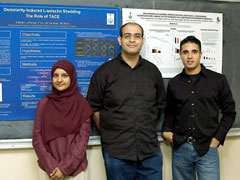Summer Students Show Science Smarts
By Tiffany Auvinen
Sunnybrook Research Institute (SRI) recently held its annual Best Summer Research Project Competition to encourage outstanding university students to pursue careers in research. Thirty-seven exemplary students funded primarily by the summer student program, run by the Department of Medical Biophysics at the University of Toronto, were invited to present their research at the poster competition.
Committed to education
“One of our key roles as an academic health sciences centre is to train the next generation of medical researchers,” says Michael Julius, vice-president of research for Sunnybrook Health Sciences Centre.
“The summer student program in research hosted by SRI is a wonderful opportunity for high-calibre undergraduate science students to appreciate what science is about and to be mentored throughout the summer by some of the best scientists in North America. The scientific excellence captured in their poster presentations attests to the quality of their learning experience at SRI.”
Each year, up to four awards, one each in the disciplines of clinical epidemiology, clinical integrative biology, imaging research, and molecular and cellular biology, are given to students. The winners receive $500, individualized plaques and their names on a Sunnybrook plaque. Each student in the summer program also receives a certificate of participation.
The event organizer, Terrie Banks of research administration, says, “Visitors were impressed with the quality of the presentations. A number of students expressed their appreciation and it is apparent that all of the students benefited from the experience.”
Honouring tomorrow's scientists
Julius presented three awards this year:
- Imaging: Jonathan Marmurek was recognized for his project, Retrospective Correction of Motion Artifacts in K-space using Optical Tracking.
- Molecular and cellular biology: Derek MacFadden won for his project titled Angiopoientin-1 Induced TEK/TIE2 Activation: Temporal Patterns of AKT/PKB Survival Pathway.
- Cinical integrative biology: Zeenat Malam received the award for her project titled Osmolarity Induced L-selection Shedding: The Role of TACE.
Malam, a 21-year-old student, is completing her Honours Bachelor of Science at the University of Toronto, specializing in health and disease. “I really enjoy working on this project because I can see exactly how my research will make a difference in clinical practice,” says Malam. “Oftentimes, research is so focused on proteins, pathways, and molecules, that its significance to the world we live in is lost.”
Post-summer plans
Malam hopes to continue her research, which focuses on using hypertrophic saline to improve the long-term survival of trauma patients, through graduate studies supervised by Dr. Sandro Rizoli. Malam thinks that the Sunnybrook & Women’s student research competition is an excellent opportunity to familiarize students with what their peers are doing. She says, “It is a great way to see how far health science research has come and the directions it will be headed for in the future.”
PDF / View full media release »





